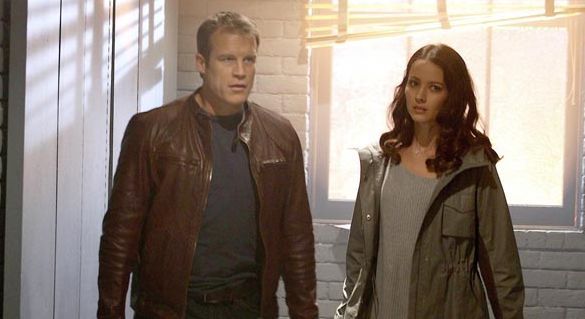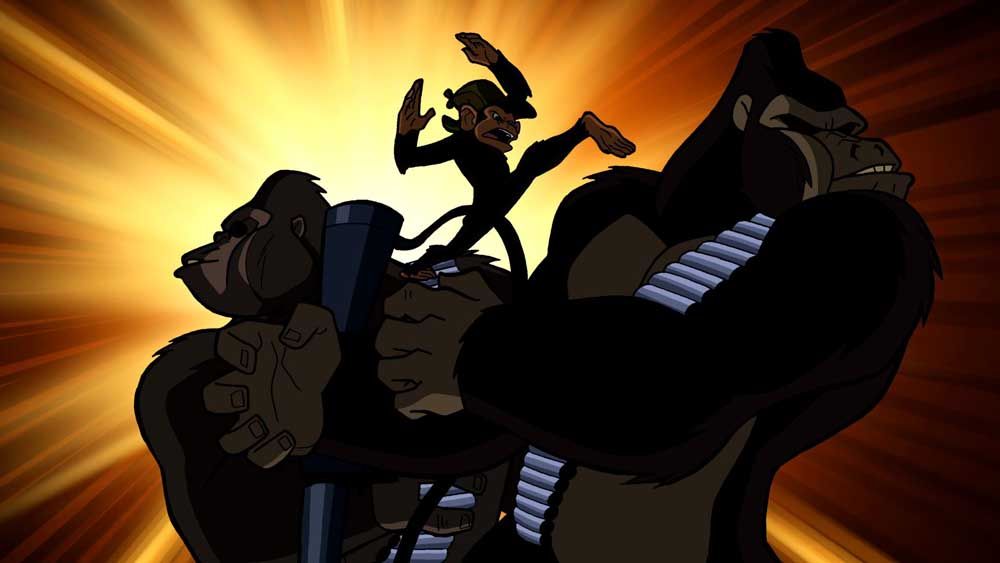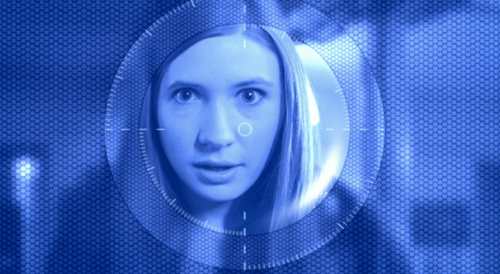It's TV for Nerds time! Below the fold, we check in on Brave and the Bold, Doctor Who, and the season finale of Human Target.
HUMAN TARGET DEPT: "Christopher Chance" Written by some guy
Lo, it came to pass: the secret origin of Christopher Chance! Now, the question, more than ever, is... why the hell is this show called "Human Target"? How did the comic book end up adapted into a show that doesn't have anything in common with it save the name? It can't be name recognition, because precious few people with a television have heard of the comic, or remember the Rick Springfield TV series. Perhaps the show morphed into Human Target simply as a way to con the studio into producing it, but then, one would think there'd be something more to the proceedings, a story someone had a burning desire to tell.
Instead, while there is some room for the program to grow and branch out like the tree it could be, it seems more content to be a telephone pole, presenting itself as the most generic of generic actioners. Plots, scenes, dialogue, relationships, you name it, are strung together with cliches rather than solid writing-- this episode in particular features the "mercenary on the case that changes his mind," the "girl that inspires the hero but ends up in a refrigerator," the "bad old boss/partner," the "mentor figure who is totally only there to get killed," a boring macguffin, and probably a couple more, as we also learn that "Christopher Chance" is merely an assumed name, passed down through a line of super-bodyguards. Every event or line of dialogue, however, is completely predictable. The creators seemed to be saving their ingenuity for fight scenes and set pieces, but now that Christopher Chance has found himself in a fistfight in every means of human conveyance you can think of, from bullet train to cable car, the ingenuity has begun to dry up. There is a decent chase through a giant-cargo-box-laden dock in this one, though.
So why do I stick with the show? Well, I like the cast; Mark Valley and Chi McBride, especially, have been incredibly likable in their other, David E. Kelley-led projects, and McBride earned my admiration forever with Pushing Daisies. This series lacks the smarts or whimsy that series enjoyed, relying entirely on the actors to plow their way through wooden scripts. In this episode, we're greeted with a cast of television all-stars, including Amy Acker (admittedly, I'd give up my life of assassinating for Amy Acker in a heartbeat), Armand Assante (now less intelligible than Sly Stallone), Lee Majors (the motherbleepin' Six Million Dollar Man), and Lassie from Psych-- with an evil beard! They are try like hell, but this show stands ready to stamp down any verve or sense of originality. It's a shame, because I had hoped that it would at least feel like a fun 80s TV throwback; sadly, the Knight Rider remake probably had more personality than this.
BRAVE AND THE BOLD DEPT:"Gorillas in Our Midst!" Written by Todd Casey
The luxury these animated DC shows seem to have is that they can be fun (yes, fun is, sadly, a luxury these days with DC properties). The folks making this show aren't ashamed to dig into DC's more eclectic characters-- this episode, for instance, features Detective Chimp, Vixen, and B'Wana Beast, who I think has gotten more attention on TV than he ever did in the comics. In this episode, B'Wana's aware of his own D-List status; he's not even at Stephen Baldwin levels of superhero fame (more like Daniel, I'd say). The point is, though, he tries, proving that any superhero can be great if he-- and by extension, the writers-- care enough. No character is a bad character, after all.
The major portion of this episode involves Gorilla Grodd teaming up with the Gorilla Boss of Gotham and Monsieur Mallah to overthrow the humans and put them in zoos so that Grodd can rule Apetopia, and, you know, that's a good plot. Plus, Detective Chimp! Unfortunately, Chimp's played for laughs and has some kind of bizarre half-English accent that comes off as the bad kind of silly, rather than the good, though I did enjoy his constant hitting on Vixen. Besides, how many times have you seen Detective Chimp in the last three decades, let alone on television? Exactly. I'm pleased to see the creators of this show dig deeper into the Silver Age and beyond. If the Green Team shows up, I'll swoon. Also, the teaser features a full-on Jim Aparo version of the Spectre who turns a guy to cheese so that the rats he experimented on will eat him. That's hardcore for what's ostensibly a kids' cartoon (but we all know it's for the paunchier, balding kids among us).
Now for your Burgas-level moment of pedantry: Detective Chimp says "refract" when he totally means "reflect." The Men in Black animated series taught me that one! Then again, his grasp of the English language is superb for a chimpanzee, so I guess I can forgive him.
DOCTOR WHO DEPT: "Victory of the Daleks" Written by Mark Gatiss
(Too tired to screencap, so I just nicked the above image from Blogtor Who. I repay the chap(s) that run(s) it with a link, the currency of the interwebs!)
Last week, I said one of the main themes of Doctor Who was "choice," and this week, we see that again. I maintain the other two prominent themes are "war" and "death," two things that go hand-in-hand. "Victory" drops us into a war, the Second World War, during the London blitz, bringing the Doctor face-to-face with Winston Churchill and his new ally-- the Daleks, the Doctor's archnemeses. Ian McNeice portrays Churchill as a bit too "kids' telly," a man made entirely of bluster, a larger-than-life, nostalgiac Churchill. It fits for the world of Doctor Who-- perhaps every modern Dalek story relies on rosy nostalgia-- but some moments come off as if McNeice is playing to the cheap seats. When he says he'd team up with the devil himself if it meant stopping Hitler, though, I believe him-- ever the pragmatist, Churchill lets some of his bastard show.
So, the Daleks. Having not grown up with the show or spent any time in the United Kingdom, I don't have that inherent reverence for the Daleks like everybody working on this show seems to have. Like any archenemy, be it Dr. Doom, the Joker, or the Republican party, overuse turns an enemy into a tired old thing, one best kept in the closet for some much-needed recharging, before diminishing returns kills the energy. True, we haven't seen a Dalek story since 2008, but their menace continues to decrease, for me, with each passing adventure. The new, redesigned, more colorful fleet of Daleks we get in this episode clearly calls back to the Peter Cushing movies, but most of their screentime is spent sitting about and shouting rather than, you know, exterminating. The spitfire-vs.-UFO dogfight in space is a gorgeous bit of spectacle, but there's nary a pepperpot in sight, there. Kids like the Daleks, though, so Daleks they shall have. Admittedly, they fit in perfectly with the theme of World War Two; if the Daleks are a metaphor for anything, they represent the Nazis, especially having been created less than twenty years after the close of the war. This episode makes the comparison explicit with talk of a "master race," as the Daleks again threaten humanity.
Ahh, humanity-- the secret fourth theme, at least in the Davies-birthed Who revival. The Daleks do not account for humanity, and can't even tell when they've accidentally created it. The Doctor doesn't quite have a grasp on humanity like he thinks he does, either. Despite closing in on a millennium of time and space travel, and having saved the Earth hundreds of times, he's still coming to those "indomitable" humans from an alien point of view. Amy Pond, however, can see what the Doctor and the Daleks can't-- and that's how she saves the day, again. Last week, she recognized the soul of a space whale, and in this, she cuts to the true heart of Professor Bracewell, the pivotal character. I haven't spoken much of Karen Gillan in the role of Amy Pond-- she plays the character as the elegant gazelle to Matt Smith's "drunken giraffe." Those lovely wide eyes soak up the environs around her, even as she plays it cooler than many of her predecessors. While the Doctor believes humanity's core lies in suffering and the overcoming thereof, Amy finds humanity in lost loves, wistful remembrances, and unexpected kindness. She's got things figured out.
This episode could have used three more minutes-- and so could The Beast Below from last week. I've noticed the runtime has shrunk by a few minutes or so-- must be that budget cutback in action! I guess it saves a day's filming, after all. Those three minutes, however, would give just enough time for some breathing space and necessary explication or characterization. The pacing feels just a tiny bit off recently, but maybe it's all in my head. After all, I'm only human.



